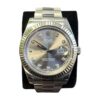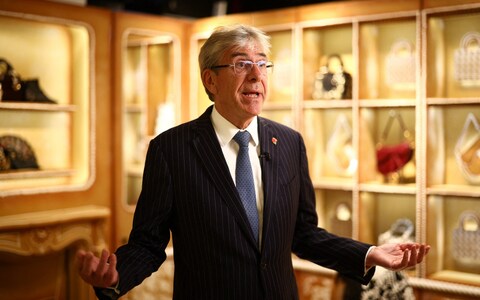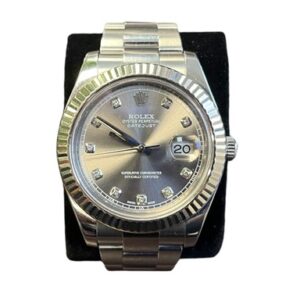Harrods has replaced some of its most expensive handbags with £250 versions in airport shops as it blamed Rishi Sunak’s tourist tax for deterring wealthy overseas shoppers.
Michael Ward, managing director of Harrods, said it had been forced to “reshape the whole of the price architecture” in its airport stores because of a slump in tourist spending.
The luxury department store has now focused on selling ranges of robes and beachwear in its Heathrow and Gatwick concessions, with the majority of products priced at less than £250.
It represents a significant price divergence from ranges previously sold at the luxury retailer’s airport shops, which included luxury handbags worth thousands of pounds.
Mr Ward said: “We used to be able to sell a £1,000, £1,500 handbag and people would save up and say ‘I’m going to have that bag and I’ll buy it at the airport, because I can get £200 or £300 tax back’.”
It follows the Government’s decision to axe VAT-free shopping for tourists visiting Britain, following the UK’s departure from the EU. The move has been described as an “own-goal” by many retailers who say customers have ditched London and are now visiting Paris and Milan to buy luxury handbags and jewellery. Travellers can still claim back VAT on their luxury purchases if they buy within the European Union.
Luxury retailers including Mulberry and Rolex have quit their stores in Heathrow in the wake of the move, with Heathrow earlier this year warning it was struggling to fill empty sites.
Harrods managing director Michael Ward said that trading had been affected by the loss of VAT-free shopping
Credit: REUTERS/Henry Nicholls
Mr Ward said it had become “a lot tougher” to trade in airports and that things were “only going to get worse”.
He added: “People have forgotten that [the UK’s tax-free shopping] has disappeared and they’re actually quite shocked when they go to buy it at the airport and they’re not getting a bargain.
“[Customers think] ‘why would you now wait to buy that product in the airport? It will just give you something else to have to carry on the plane’.”
The Government has argued that tax-free shopping is available for all non-UK visitors “who purchase items in store and have them sent directly to their overseas address”.
In response to criticism earlier this year, a government spokesman said: “Extending the scheme to EU nationals could cost British taxpayers around £1.4bn a year, meaning taxes would need to go up to pay for it at a time when we’ve already taken difficult decisions to get debt falling.”
Mr Sunak on Wednesday poured water on hopes the tax move would be reversed, saying most of the benefit for the tax break went to central London.
Mr Ward said Harrods was still investing heavily in its Knightsbridge, London. However, in accounts published on Thursday, Harrods revealed its revenues had yet to return to pre-pandemic levels in its latest financial year.
Revenues totalled £994m in the year to the end of January 2023, compared to £1bn in the year to January 2020. However, it was an improvement from last year, when Harrods posted revenues of £654m.
Mr Ward said trading had been in part affected by the loss of VAT-free shopping in the UK. He added that Harrods has been battling to stop travellers going elsewhere by pushing brands to launch products exclusively in its stores.
While tourists are starting to come back, the Harrods boss said he did not expect Chinese travellers to return to the UK to the same level.
He said these shoppers were “extremely price sensitive”, with Paris set to be the “real beneficiary” of those tourists travelling again and spending on luxury in Europe.
Some luxury stores have suggested other methods could be used to lure high net worth travellers back to Britain. Burberry suggested last month that vouchers should be offered to rich shoppers to compensate them for the loss of tax-free shopping.
However, Mr Ward said: “I’m not sure why we’re over complicating everything, by trying to devise a unique system that’s specific for the UK when the rest of the world has one system that works.”
He said more of the focus should be on the damaging effect that fewer tourists will have in the UK.
Mr Ward added: “We’ve got to almost stop talking about how much shopping is going abroad, but talk more about, actually, how much is the hospitality sector losing out, how many fewer people are going to our museums?”









